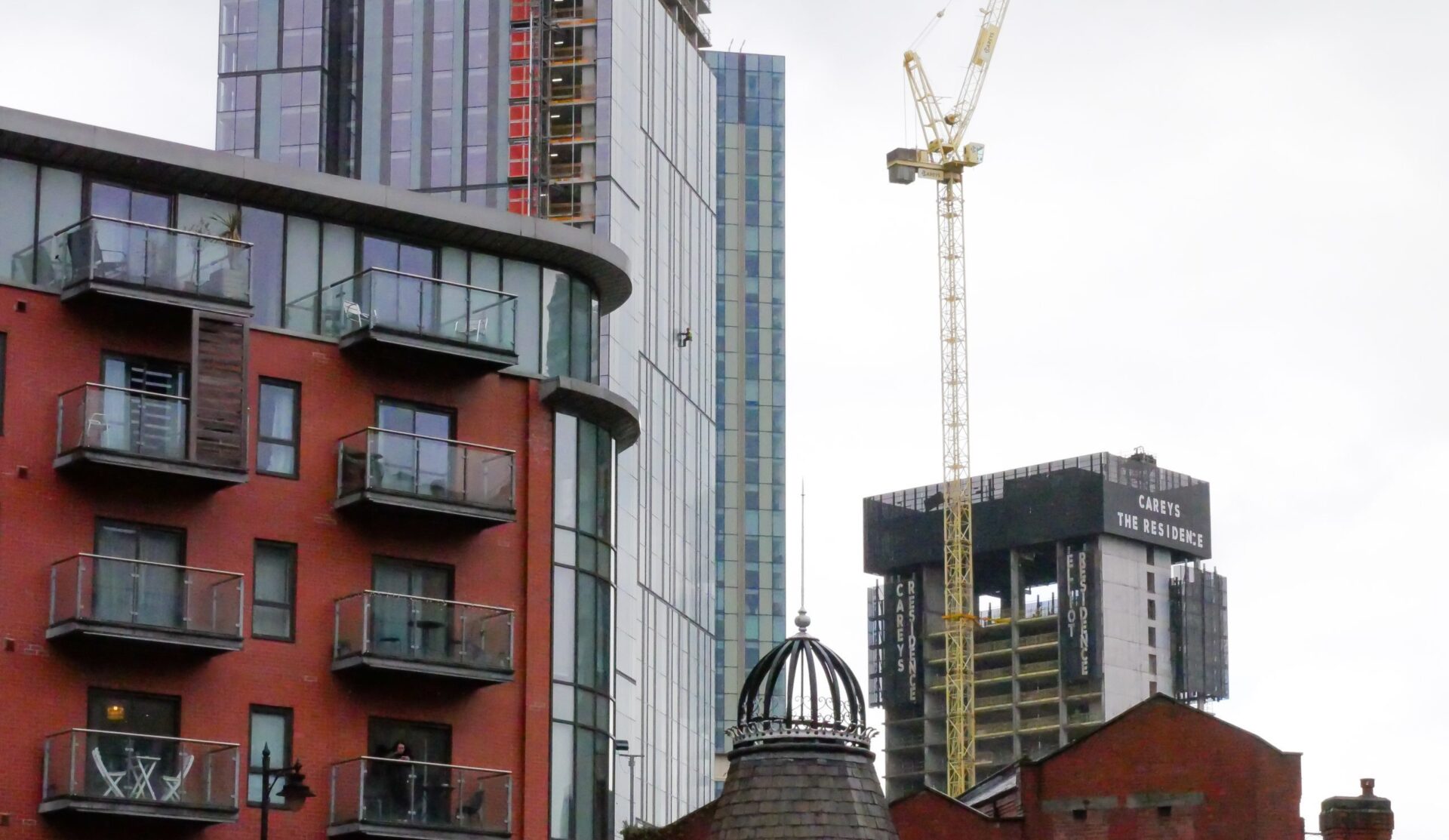The Subplot
The Subplot | High interest rates, resi towers, freeport fun
Welcome to The Subplot, your regular slice of commentary on the North West business and property market from Place North West’s analysis editor, David Thame.
THIS WEEK
- Interest rates: why residential tower developers need to beware, and why all developers need cash
- Elevator pitch: your weekly rundown of who and what is going up, and who is heading the other way
INTEREST RATE ROLLERCOASTER
Interest rates have just gone up to 0.75%, and are likely to rise some more. The consensus among market-watchers seems to be that by the end of this year it could be hovering a little short of 2%, and will stay in that kind of territory into 2024. Compared to the double-digit interest rates of the late 20th century this is no big deal. But if your business assumed a 0.5% interest rate, and it is soon to be four times higher, it is bad news.
The good old days
Today, Paul Burgess runs consultancy Adra, but until 2017 he was a main board director at Cheshire property empire Emerson Group. Interest rates in 1987, the year he got his feet under the desk, were 8.4% then rose to 12.8% by the end of 1988, hitting 14.9% in late 1989. A different world. More recently Burgess was chief operating officer at DeTrafford Estates.
Boomers know best
Herd memory has been lost. Readers in their 40s might have adult memories of interest rates above 5% but readers will need to be in their 50s to recall rates in double digits. Everyone else is in the dark. So what needs to be said? Burgess offers two big takeaways. One, hang onto your cash. Two, expect casualties, especially among businesses that can’t generate cash quickly. He has his eyes on some (but not all) tower developers.
The golden rule
Surely with inflation zooming towards a peak of approaching 9% the last thing anybody ought to do is hang on to cash? Absolutely wrong, says Burgess. If ever there was a time for property businesses to hang onto wads of notes, it is now.
“I don’t think we’re heading back to my world of double-digit interest rates. But the fact remains, when interest rates go up is when war chests are useful,” says Burgess.
Let me repeat
“You can fund whatever you need to from cash until interest rates come down, because it is not so much inflation going up as interest rates going up that will choke off investment and expansion plans,” Burgess says. “It’s never a bad thing in business to keep cash. Never underestimate its value. The well-placed people always have it. If there’s a rule it is cash, cash, cash, cash, because the guy with the cash rules. He or she can act quicker and with more assurance.”
If no cash, then crash
Burgess says the lessons he learned in the high-interest rate world of the 1980s and ‘’90s was that opportunities will arise, and if you are waiting for loan approvals they will go to somebody else. A tough environment is the time to buy, and the buyer with cash will snatch the prize. “If you don’t have cash then it’s a decision to leverage all the time, which is a problem for a minority of developers. That’s okay in a low interest rate economy, when everything is on an even keel. But as soon as rates go up, it is not,” he says.
Watch the towers tumble
If you can’t generate cash, or can’t generate it quickly enough, then the next few years might pose a problem. Tower developers with large upfront costs, limited options to phase or postpone, cashflow in the future but not now, and loans that are getting pricey, had better watch out, says Burgess. That Burgess was instrumental in setting up DeTrafford Estates, which has experience in this sector, gives his warning some force. Late last month DeTrafford decided to sell the Wavelength site in Salford Quays, with permission for 421 units over 26 storeys.
High rise, high risk
“High rise residential will be very much under stress simply because they can’t phase until the market picks up. That’s where it will hurt most if developers didn’t see the problem coming. Of course most North West tower developers are astute – they know the right people and have relationships with the right funders – but there are still some who will struggle.”
Lines of credit
Some big names don’t need to worry too much about lines of credit running dry. Renaker, for instance, recently scooped £62m in loans from the Greater Manchester Combined Authority. Time will tell who did best out of the arrangement. Others (like DeTrafford) decided 2022 was a good time to move on: CEG sold its 22-storey site at High Street, Manchester, to McAleer & Rushe in January. Every developer will make different calculations of risk and reward: the problem is that rising interest rates make that task harder and more urgent.
 ELEVATOR PITCH
ELEVATOR PITCH
Going up, or going down? This week’s movers
Judder judder. Is that the sound of the Liverpool Freeport climbing a few floors? Meanwhile trickle-down economics are exactly where you would expect them to be: in the basement.
 Liverpool Freeport
Liverpool Freeport
A year after the March 2021 announcement that Liverpool would host one of eight English freeports (and 18 months since the 2020 bidding process began) the labour of creating the freeport grinds on. The formal business case will be submitted this month. Assuming it is approved, things could be functional by the summer. Nimble post-Brexit positioning? Whatever you think of this process, fleet-of-foot is what it has not been.
Despite the extended period of reflection, even now not everyone is happy: rumbling from West Lancashire about the risk of jobs being sucked into the freeport, and away from everywhere else, is ominous. More positively, Maritime Transport – a big noise in the sector – is expanding its Port of Liverpool presence from four to 10 acres.
Reports from other regions that are further along the road to approval suggest a freeport space dividend – at Felixstowe, for instance, Savills data shows supply plunged by 30% as occupiers raced to get a foothold. Fingers crossed for a similar bonus in the North West.
 Wealth
Wealth
The days when the property industry was a Conservative Party club are long gone (seriously, the mood today is not friendly). In the North West, the industry is more closely aligned with Labour, personally and politically. Local politics, power and property walk more or less harmoniously hand-in-hand under the banner of ESG. Which is why, after 15 years of pretty much continuous growth in the city centre property markets, it is worth recording the latest data on household financial resilience, eg how close to a fatal inflation-spiked crunch most people are. Has city centre renaissance helped real people’s real incomes?
The answer is a resounding ‘not really’, if a huge data set from debt and credit specialist Lowell is any guide. Take Stockport, for instance; well-located and surrounded by affluence it makes a good test case. Around 15% of the constituency’s consumers are in debt default and 60% have no savings worth mentioning, which sounds awful but is around the national average. Surely this has improved since 2017 – when Lowell’s figures begin. In fact it hasn’t, it got steadily worse every year since 2017 and then plateaued during the pandemic, getting worse faster than either the UK or North West averages. It is the same story more or less everywhere in the region, except East Cheshire and some better-heeled suburbs that started from a lower base of financial woes. This level of financial stress will limit spending power and hence the viability of many property schemes that face consumers. Levelling up still has a long way to go.
Get in touch with David Thame: david.thame@placenorthwest.co.uk | 01544 262127
The Subplot is brought to you in association with Oppidan Life.






Some of us remember the 15% interest rates and higher back in the early 90’s and before. We have always been aware of possible movements in the rates since and made sure we had enough wriggle room in our portfolio. We knew guys with 50-100 plus properties without making any allowances for increases. Yes I know people have made profits etc over the short term etc, but ours is a long term plan and having weathered the various storms over the last 37 years in property have managed to keep what we wanted and sold underperforming units. So as always buyer beware!
By Property Owner
Again, PNW authors position themselves on the wrong side of history by correlating Brexit with Freeports. We were always able to create Freeport’s within the EU. Your readers know that you know that. Why would you purposely push a narrative that we all know to be false? Scary in the current times where misinformation is rife and malignant.
By CFN
New investment already starting to flow into the Freeport area ….good signs
By George
@CFN you are incorrect. Only [partial] freeports were possible. You could not create a proper dynamic freeport in the EU and that is why the EU has such an appalling track record compared to the global competition.
By Richard W
The referendum was years ago. There is no argument to be had here. Who cares whether we could or could not have had a freeport previously. All that matters is what we do, and how we take advantage of any prevailing situation.
“The wrong side of history” is reserved for the Hilters, Pol Pots and Putins of this world. It’s inappropriate to throw that kind of criticism at those who are just perceived to hold opposite views on things.
By Jeff
Ahh Brexiters. Still shutting down logical reason. If you know anyone who works in logistics, they’ll tell you about the nightmare being caused by Brexit, particularly since the UK finally agreed to do checks at our own borders… after we put it off for as long as we could. My company now ships goods from Warrington to Dublin via Germany or Holland due to Brexit customs checks. This has created jobs within the EU, as new warehouses are being built there. So great news about the Freeports… perhaps they could give us back a small fraction of the productivity we have lost due to Brexit.
By Freeports
All these economic and logistics issues just because Brexiters believed everything they read on the side of a bus in 2016. Advice for next time you’re at the polling station: do your own real-life research and don’t just absorb everything you read in the Murdoch papers!
By Anonymous
Ahh Brexiters. Still shutting down logical reason. If you know anyone who works in logistics, they’ll tell you about the nightmare being caused by Brexit…Bravo, well said. How long will it be before the barriers and frustrations being suffered by British exporters as a result of Brexit push it back into the mainstream political/business agenda. Which international trade deals have we been to do because we recklessly cast aside membership of the EU Customs Union (that even Turkey has). Don’t even get me started about labour shortages (watch this space)…
By Numbers guy
Merseyside authorities need to make sure the port developments also lead to more ancillary and office developments coming to Merseyside too. Otherwise it will continue to be all the more for Manchester and Warrington as far as offices are concerned.
By Anonymous